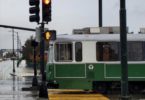By Nick Telesmanic
BU News Service
BOSTON – Whether it be by car or by public transit, commuting in the Hub is among one of the worst, studies and experts say.
According to the 2010 U.S. Census, 80% of the United States population resides in metropolitan areas, which account for only 26% of the country’s land. A November 2019 study from Clever, an online real estate referral service, expanded on this data nearly a decade later, stating that more people have begun to move to Metropolitan Statistical Areas (MSAs), resulting in longer and hectic commutes in these cities of increasing density.
The Boston area is one of the most expensive metropolitan areas to commute by private vehicles, with average annual cost can totaling $9,716.26, the study said. It is not the most costly — that honor belongs to Washington, D.C — but it costs much more than less expensive cities like Miami, Milwaukee
Despite the high price tag for driving in Boston, the city remains one of the worst cities for rush hour traffic, according to a report from research firm INRIX in February. The report classifies Boston as a non-car dependent city, as opposed to a city like Los Angeles that ranked the most car-dependent.
There’s a handful of things to point to as to why traffic in Boston is so bad. An article from Curbed Boston suggests that it might have to do with increasing housing costs, which is pushing people further back from the business center of Boston, making public transportation less of an option.
But there seems to be a more significant underlying problem in Boston’s public transportation that is making driving the safest and more reliable option.
Feeling unsafe on Massachusetts Bay Transportation Authority public transportation is very common, according to a safety panel final report conducted by an independent panel of three transportation experts. Because of how the MBTA wants to tighten their budgets around their services, it was found in the report that ‘safety is not the priority’.
“The general manager must make safety his number one priority and realize there is nothing more important to the T’ customers and employees than safety,” the panelists wrote in the report.
MBTA General Manager Steve Poftak told reporters Monday that the report was “sobering,” according to the State House News Service.
“We understood the gravity of the report and everyone understands the need to change the culture here at the T,” he said.
Louisa Gag, the operations manager of Public Policy for LiveableStreets Boston, believes these problems stem from a lack of adequate funding.
“We need to fund the MBTA and give them more money,” Gag said. “We can use that to improve things like safety and regional frequency.”
Whether or not improving the MBTA by increasing its funds will lessen traffic concerns in Boston would be challenging to determine in Gag’s opinion. But Gag does believe that a reason why traffic in Boston is so congested is due to induced demand, where the expanding of highways encourages more people to drive.
A 2018 article from CityLab goes more in-depth on this issue. They highlight a three-year project on the Katy Freeway in Houston. The $2.8 billion project widened the freeway to “alleviate severe traffic congestion.” And yet, after the freeway was widened, congestion got worse, the article said.
“Adding lanes to highways is not a solution to congestion,” Gag said.
CityLab’s executive editor, David Dudley, expanded on the 2018 report by providing more
experts who have closely studied induced demand. Roger Millar, the head of Washington
state Department of Transportation, frequently stresses the idea that expanding highways will
do nothing to help Washington’s traffic issues, according to the Spokesman-Review in 2018.
“He’s been outspoken on how new highways don’t ease congestion,” Dudley said.
Millar highlighted the lack of affordable housing near business districts, particularly in Spokane, Washington in the Spokesman-Review article. This matches up with Curbed Boston’s report that lack of affordable housing causing congestion in Boston.
The City of Boston has released a mobility plan titled Go Boston 2030 in order to create more efficient transportation networks, a plan which LivableStreets Boston is in favor of.
“Through the implementation of this plan, people will be able to access all parts of Boston safely and reliably,” the report said.




